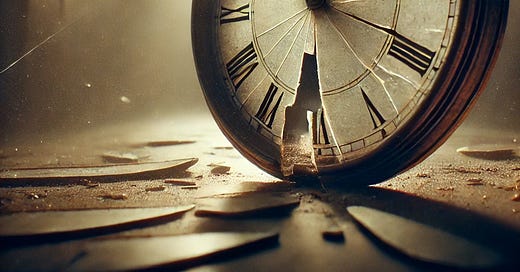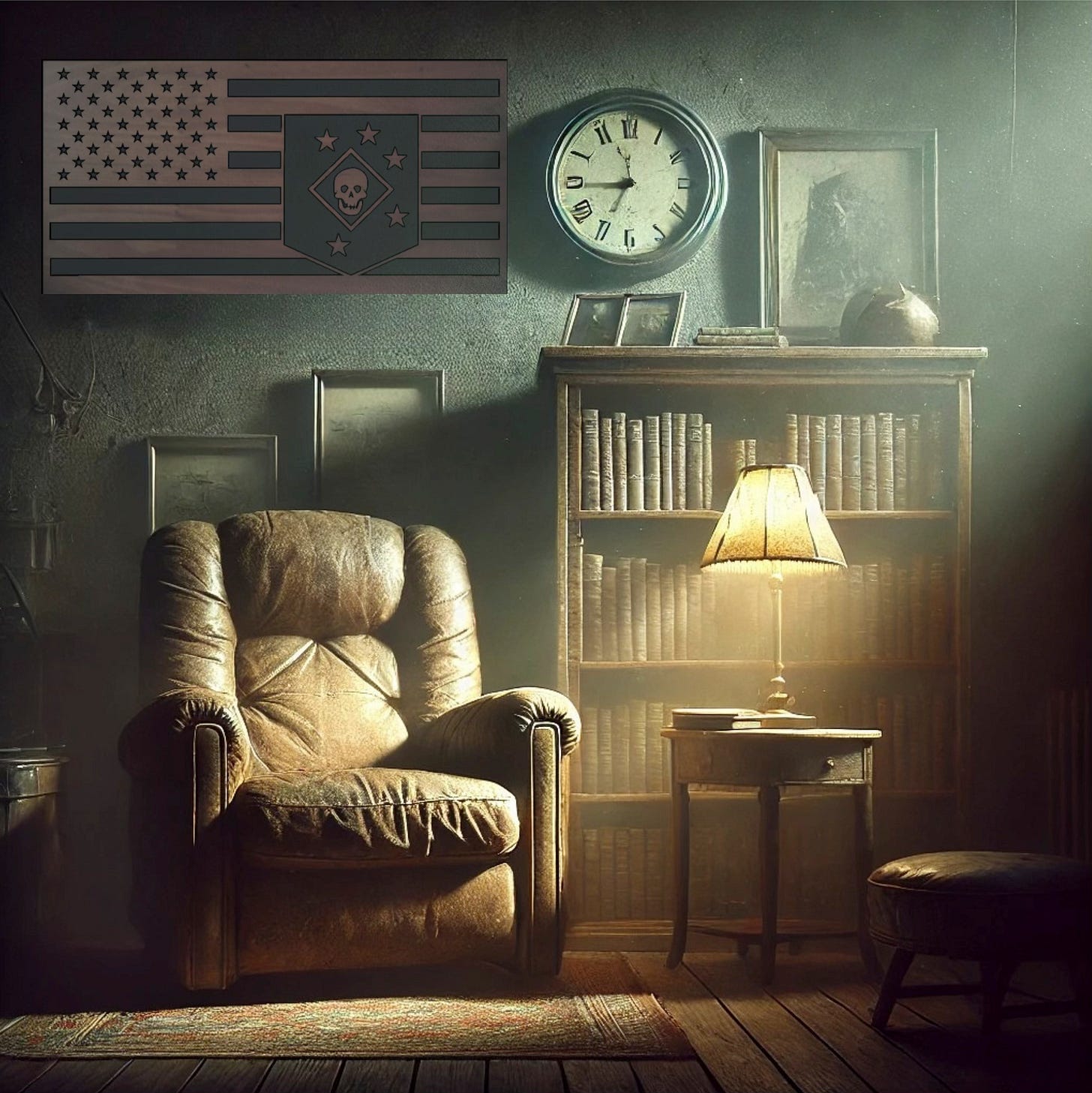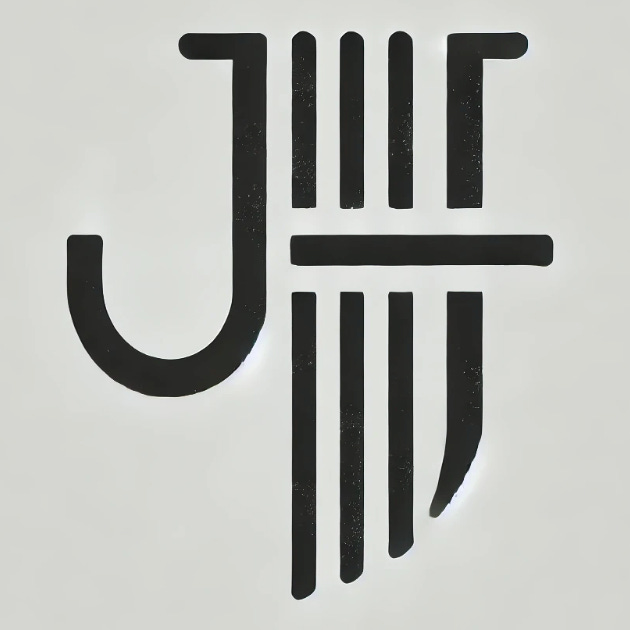The Ticking Silence: When Time Runs Out, Who Are You?
Shedding the Mask, Facing the Void, and Choosing to Live Before the Clock Stops
Borrowed Time
"You've never felt like you could be yourself around me?" She asked, her voice a quiet storm of confusion and pain. She was trying to hold steady, but I could see the cracks forming. Her deep forest eyes, the ones that had once watched me disappear on too many deployments, now searched my face with something raw and uncertain.
Frustration tightened her features while sorrow etched deep lines across the face I had memorized long ago. Usually composed, her expression now carried the weight of anger and grief in equal measure, strained under the weight of something she wasn’t sure how to carry. Her jaw clenched, but her tired eyes betrayed the toll of each borrowed moment.
She sat at the edge of our worn leather couch, her hands gripping the fabric as if it could anchor her against the relentless march of time. In our dim living room, a lone lamp spilled uneven light across the hanging medals and decorated paddles that had once symbolized honor but now merely marked the passing days. A broken clock on the wall hesitated between ticks, its erratic rhythm a reminder that time itself is absurd.
I lay stiffly in the recliner, the damn thing creaking beneath me as I shifted in vain attempts to ease the pain that had become a constant companion. A sick joke from a body that still hadn't accepted the reality of how many miles I had on this old square body. The sterile hum of the oxygen machine’s steady hiss served as a grim metronome to my dwindling hours.
"I've felt like a version," I said, my voice rough, not just from disuse but from years of shouting over roaring motors, gunfire and the occasional college football game.
Her brow furrowed. "A version?" she repeated, her tone sharpening. It reminded me of the way she sounded on those long nights waiting for updates, back when I was in places neither of us liked to talk about. That quiet panic she never let fully slip. "What the hell does that mean?"
I exhaled, long and slow. "Not my whole self, I guess. Not who I really am. Whatever that means at this point." I shifted , wincing as pain returned, a reminder that time was eroding me, moment by borrowed moment.
Her hands curled into fists at her sides. She inhaled sharply. "Then why the hell did you marry me?” Her voice cracked, raw and unfiltered, the weight of nearly two years of watching me wither pressing into those words. Her voice cut through the room, through me. I glanced at the half empty whiskey glass beside me, then back at her.
In the whirlwind of recent years, with medications dulling my senses and my body slowly decaying, something inside me broke. I finally felt the walls come down. The ones I'd held up since the first time I stepped into chaos at twenty-two, the ones that had kept me alive and kept everyone else out.
For once, I didn't care about holding it together. For once, I simply couldn't.
It wasn’t that I didn’t care about her, I did. I loved her more than anything. But everything else? Perception, expectations, pretending? None of it mattered now. It hadn’t mattered in a long time.
The doctors had said I would not survive a year after the diagnosis. That deadline passed, and yet here I was. Every breath now felt like trespassing in a life already signed away. It reminded me of how I felt coming home from my last deployment, standing in my own house, looking at my own reflection, feeling like a ghost in my own skin. As if what had returned was just a formality or that I had already been laid to rest in a strange, foreign land and now wandered a surreal existence where time itself mocked me.
Still, I was breathing. Still, I was fighting, though against what I no longer knew. I was less of a man and more of a shadow of one.
I met her gaze, my voice quieter this time. "I've never felt like myself with anyone."
The fight drained from her posture, replaced with something softer. "I don’t understand," she said. "You mean me specifically, or…”
"You didn't do anything wrong," I cut in. "No one did. It was my fault."
Her fingers twitched where they rested on her knee, the way they always did when she was trying to solve a problem too big to hold in her hands. "What are you talking about, babe?" she asked, her voice threading between stern and breaking.
I stared past her, at the old wooden bookshelf lined with dog eared paperbacks I’d meant to read but never did. At the photos of us and our kids. Smiling, young, before my body became a battlefield of its own.
"I blew it," I muttered. "I did so much wrong."
She shifted closer, her hand shifted in mine, her grip firm but warm. A tether. She always had been.
"Everyone loves you, sweetheart. The guys from your old unit, the team, hell just about every stranger turns into your friend. You’re the kind of man people remember."
I let out a breath that felt heavier than it should have. "Yeah. They respect me. They trust me. I spent my whole life making sure of that." I paused, my gaze drifting to the ceiling, where the same ugly popcorn texture stared back at me. "But it isn't the same as being truly known."
She didn’t move. Didn’t speak. She just listened. She was good at that. She always had been.
"My whole life, I cared too much about what people saw in me. I needed them to see the reliable, strong leader. I needed to be the one they counted on, the solid one, the capable one, the easy button." My grip on her hand tightened. "I bent myself into every shape they and the mission required. In the process, I forgot what it felt like, to just be"
She stayed quiet, the kind of quiet that wasn't empty but waiting.
A bitter laugh escaped me, born more of shame than regret. "I was so obsessed with building an image piece by piece, until there was nothing left of who I was. I cared so much about being seen as the right kind of man that I never actually let myself be me.”
Silence stretched between us, broken only by the soft mechanical hiss of the oxygen machine.
Her eyes glistened. "Sweetheart, you did what you had to do. You put the mission first, you put others before yourself. That’s what makes you a good man.”
"Does it?" I scoffed, shaking my head. "Because I don’t think it does.”
She didn’t answer. She just waited, patient as always, like all those nights when she waited for my voice on a call that might never come.
"I wasn’t putting the mission or others first," I admitted. "Not really. I was putting me first. Not in the way that it sounds, but in the way that mattered. I was desperate for people to see me a certain way. I built myself into that image: piece by piece, decision by decision, deployment by deployment. Until there was nothing left but what everyone else needed me to be."
She drew a shaky breath, her fingers tightening around mine. "You were a leader," she said. "You kept people alive."
"Yeah. But I never figured out how to live for myself," I admitted.
She wiped at her face, her expression shifting into something determined. She wasn’t the type to let things go unanswered.
"Then talk to me now," she urged, voice firm but trembling. "Let me see you. Be who you really are. There’s still time. Use it.”
I looked at her then, really looked at her. The woman who had stood by me, through every deployment, every homecoming, every silent night where I sat awake staring at the ceiling, unable to say why.
I had spent my whole life waiting for the next mission, the next problem to solve, the next fight.
Maybe this was my last fight in this world, where time neither spares nor cares. Each hesitant tick of that broken clock reminded me that my moments were stolen, and every fleeting second was a fragile mercy.
Maybe this was the last one worth fighting for.
Time’s Relentless Rhythm
Time is a strange thing. It can be measured in hours and seconds, tracked by the movement of the sun, and marked by the slow decay of everything around us. Scientists say it is a dimension, woven into the very fabric of the universe. But for all its precision, time remains elusive. It slips past us unnoticed, marches forward without concern, and never offers a pause.
Philosophically, time becomes even more uncertain. Some argue it is nothing more than a construct of the mind, a tool we use to impose order on chaos. Others see it as an unstoppable force, indifferent to our plans, our pain, and our desperate attempts to make sense of it. In Borrowed Time, the broken clock and its uneven ticks serve as a quiet reminder: time does not wait, it does not care, it simply moves.
The Illusion of Self
There comes a point when you are forced to reckon with the weight of your own reflection. Not the shallow, passing glance in a storefront window, but the kind that lingers, where the eyes don’t quite match the person staring back. It is in this moment that you must decide: Do I truly know myself, or have I spent my life wearing a mask, hoping no one notices the cracks?
The short story Borrowed Time is a testament to this reckoning. It is the quiet breaking of a dam, the moment when the weight of a constructed life becomes unbearable. The protagonist, a man who has spent decades shaping himself into what others needed, a leader, a protector, a warrior, now finds himself at the end of the road, realizing that he has never truly been seen. And worse, never allowed himself to be.
This is where Absurdism and Stoicism meet, not in opposition, but as reluctant allies.
The Absurdity of Borrowed Time
Absurdism teaches us that life may not offer neat explanations or fair outcomes. The clock keeps ticking whether we laugh or cry. Yet we can choose to stand against the absurdity with our heads held high. Find reasons to smile, even in the shadow of regret and uncertainty. Let that smile be your tiny rebellion against a universe that offers no guarantees. In the spirit of the short story, time can feel borrowed, but we can still invest those moments in discovering who we are.
Life, for all its structure and perceived meaning, does not adhere to the narratives we construct. We build stories, roles, and expectations, only to be met with the absurd indifference of time itself. In the story, the protagonist is told he has a year to live. That deadline comes and goes. He remains. But what is the purpose of survival if the person enduring it no longer recognizes who they have become?
Nietzsche once wrote1 of the eternal return, a thought experiment asking: If you had to relive every moment of your life exactly as it was, every triumph, every mistake, every hesitation, would you accept it? Would you embrace it, knowing that each decision was yours alone, or would you recoil at the weight of your own choices?
The idea is not that life offers inherent meaning, but that we must live as though it does, because to do otherwise is to surrender. The man in Borrowed Time has spent his life pushing his own boulder, but he did not choose it. It was assigned to him, shaped by duty, expectation, and the unrelenting weight of necessity. Now, at the edge of his existence, he is faced with the most absurd truth of all: everything he fought for, every carefully placed brick of his identity, has left him a stranger to himself.
And yet, he remains. Still breathing. Still questioning. Still fighting, even if the fight has shifted inward.
Stoicism and the Battle for Acceptance
If Absurdism tells us that life lacks inherent meaning, Stoicism tells us that we are responsible for how we meet this fact. It is not enough to acknowledge the absurdity, we must decide how to live within it.
The protagonist’s wife, steady and enduring, reminds him of this. "Then talk to me now. Let me see you. Be who you really are. There’s still time. Use it."
She embodies what the Stoics have always preached: The only time that matters is now. Regret is a luxury, one that serves no purpose beyond the weight it adds to our shoulders. If he has spent his life constructing a false self, then the only reasonable response is to stop. Right now. Not tomorrow. Not after another drink. Now.
This is the Stoic response to suffering, not to lament the past, not to dread the future, but to own the moment as it is. The man in Borrowed Time has lived a life dictated by external expectations, by the mission, by the unspoken rules of service and survival. But now, stripped of all that, he has only one frontier left: himself.
The Freedom of Authenticity
Letting go of the masks we wear can feel like stepping out into the cold with no coat, vulnerable and exposed. But there is also a strange warmth in being real, a quiet relief that comes when we no longer carry the weight of maintaining an illusion. Masks can shield us, but they can also suffocate. The longer we wear them, the harder it becomes to tell where they end and where we begin.
When we stop twisting ourselves to fit expectations, we create space to be seen as we are, not as we pretend to be. Authenticity is not the license to be cruel or reckless; it is the courage to express our true thoughts, desires, and fears without the safety net of performance.
If friends or family walk away because of your honesty, it is a reflection of their fragility, not your worth. Not everyone is ready to embrace the truth, but that does not mean it should remain hidden. There is a quiet peace in setting down the heavy armor of pretense. It is only when we stop carrying the weight of expectation that we realize how light we were meant to be.
The Quiet Tragedy of Being Seen
There is a kind of humor in this, though not the belly laugh kind. More the tired chuckle of a man realizing he’s been playing the wrong game all along. The protagonist laments that he was never truly known, that respect is not the same as intimacy. Yet, as his wife sits with him, listening, waiting, it becomes clear that she has always seen him, just not in the way he expected.
This is the absurdity of human connection. We long to be understood, but we fear what will be revealed. We construct versions of ourselves, believing that if we are strong enough, competent enough, reliable enough, we will be loved. And yet, love has never required those things. Love has always been there, waiting, quiet and patient, asking nothing but truth in return.
The choice is simple, though not easy. Continue the illusion, carry it to the grave, or strip it away and meet whatever remains. Acknowledge that time is a thief, but it is also a gift, one that is only useful if it is used.
Be your true self not tomorrow, but today. There is freedom in discarding masks and standing firm in the face of absurdity. No clock can measure the depth of your character, and no ticking second can rob you of the choice to live authentically. Like the broken clock in Borrowed Time, moments may feel fractured, uneven, and stolen. But within them, there is still space to be seen, to be real, to be free. Let that choice be your gentle triumph, a bold act of resistance in a world that never stops counting the hours.
Nietzsche, F. (1978). Thus spoke Zarathustra (W. Kaufmann, Trans.). Penguin Classics.








Every word of Borrowed Time hit me like a brick. I once had a counselor ask what makes me happy. So I would share an answer, which was met with ‘no, that’s a role you fill for someone else’, or ‘no that is their happiness that you are a part of’. What makes YOU happy. A profoundly simple question that I couldn’t answer.
Every moment from before I could remember was for those around me. Taking care of siblings, of parents that were too drug addled to care for themselves, of Marines whose lives were my responsibility to protect and to mold, of spouses and children that I had to do the same with.
I still don’t know who or what I am for me. If I’m being honest I don’t even know how to go about figuring it out or if I want to. Being for others is my comfort zone, being for me is terrifying to even think about